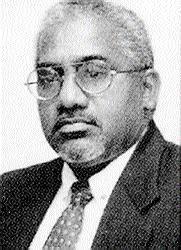
Persaud Wilberne Persaud, Financial Gleaner Columnist
For decades, Alan S. Blinder, a Princeton University economist, former Federal Reserve Board vice-chairman and perennial adviser to Democratic presidential candidates, argued along with most economists that free trade enriches the United States and its trading partners, despite the harm it does to some workers.
"Like 99 per cent of economists since thedays of Adam Smith, I am a free trader down to my toes," he wrote back in 2001.
Politicians heeded this advice and, with occasional dissents, steadily dismantled barriers to trade.
Yet today Mr. Blinder has changed his message helping to "lead a growing band of economists." [Wessel and Davis: Wall Street Journal].
Blinder is influential among the leadership of the Democratic Party in the U.S. He advised former presidential candidates John Kerry and Howard Dean. Anyone who read Economics at the UWI Mona Campus in the past two decades would be familiar with this name. 'Baumol and Blinder' was how the introductory text he co-authored was known. To learn that Blinder joins the band led in popular journalism by Lou Dobbs must be a shocker. Is he finally living up to his name?
Lou Dobbs is merely the most visible of a group that sees globalisation and 'outsourcing' made possible by information technology as the death knell of American prosperity. His popular CNN programme 'Lou Dobbs Tonight' dedicates most time to showing how displaced American workers' jobs move to India and other undeserving places.
Stop to consider
Mr. Dobbs never stops to consider that perhaps the socks he wears, the watch, the microphone, the very cameras he peers into-would be triple their cost without China's low paid workers, earlier Japanese manufacturing process technology and today's highly skilled Indian software engineers. He does not stop to consider what the end of Wal-Mart would mean to U.S. consumer prices and standard of living. He, like the British imperialists before him, wants to have his cake while continuously gobbling it down.
Adam Smith was perfectly correct. Free trade benefits both parties to it. The benefits of specialisation can be grasped by babes in the woods. But the world has never had free trade, perhaps never shall. The British, when it suited them, when they could benefit most, forced the rest of the world to 'embrace' the model. The Americans have done the same from their founding, more so since the end of the second European war for world resources.
Fiercely protects farmers
Most people don't know that the U.S. is the world's largest primary producer and that it fiercely protects its farmers while insisting countries like Jamaica dismantle protection of its own mostly struggling farmers.
Carlos Diaz-Alejandro, the late Cuban-born economist domiciled and practicing in America - certainly no communist plant - said that America prefers its materials raw but people polished. So it import bauxite rather than smelt in source countries but give visas only to people with high level skills - engineers, medics, mathematicians, child prodigies of violin and tennis.
The USA quite unlike Germany for instance, has almost perfected absorption of immigrants of vastly different cultures if not different races. Its technological leadership would not be as secure as it still is without the hordes of postgraduate students who never return home, without the entrepreneurial drive and urge for life struggle of "illegal aliens" who reap the lettuce and grapes, make up the beds at Courtyard, Marriott, Days Inn and Hilton.
Blinder's concerns stem from high level skills areas, such as software development, financial research, law and even medicine, being at risk given quick an almost costless internet information transmission.
In time this phenomenon will grow. His solution: train people for 'face-to-face contact' jobs that cannot be outsourced. Could he mean barbers. This is almost bizarre.
The lesson for Jamaica is that protectionist forces, warriors are at work.
For them, it's almost a natural God-ordained thing-world leadership and high living standards-they can't help it really. Part of their operation is to claim free trade rights while denying them to others.
In negotiations on World Trade Organisation and bilateral arrangements, this feature will be evident, though not openly.
But we so often enter these arenas weak, handicapped by a debt burden that arches the spine unnaturally. The pen is indeed, mightier than the sword, ideas more powerful than material. You might retort: 'But only in the long run". And you would be absolutely right. But we need to start somewhere.
Stand up for our right to preserve our farms, our environment, our way of life, even conch shells at ICC Cricket. We shall not be alone and these ideas will gain currency.
wilbe65@yahoo.com

